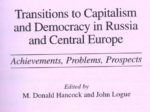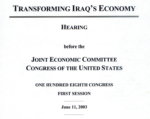Little-known proponents of workplace democracy:
Alexis de Tocqueville (1805-1859)
David Ellerman's draft and published papers

This paper attempts set forth systematically some of the knowledge questions that determine certain strategies for institutional change.

This paper has been cited many times as the representative critique of voucher privatization with investment funds.

This is the text and edited video of an interview with The Straddler in January 2016 entitled: Against the Renting of Persons.

This is my testimony to the Joint Economic Committee of Congress in 2003 making recommendations after the U.S. conquered Iraq and had to figure out what to do. Today, it can be read as a negative-blueprint since the U.S. seems to have done just the opposite on every count.
My paper on marginal productivity theory and the labor theory of property in the on-line journal Economic Thought drew commentaries for Jamie Morgan and Ted Burczak. After some back and forth on the journal’s discussion forum, this Reply to Commentators paper was published as an article in the journal.

This paper, written upon request for the UNDP volume on Capacity for Development and in time for a big conference in Mexico on the topic, is a good brief summary of my then forthcoming book, Helping People Help Themselves –even if I was screwed out of a sizable honorarium by one of the editors, Malik.

This is a paper on the role of neoclassical economics in the disastrous “Big Bang” or “shock therapy” advice given by Western academics and Western advisory agencies to the post-socialist countries. It is part of the Oxford Handbook of Professional Economic Ethics.

This paper, written for a classical liberal audience, goes into the fault line running down the middle of the doctrine: does classical liberalism imply democracy? The libertarian wing, represented concretely today in the startup or charter cities initiatives, only requires consent (and exit) so the consent could be to a non-democratic pact of subjection. The democratic form of classical liberalism is represented by the mature James M. Buchanan who held that a liberal social order required people to be principals in their organizations who could only delegate but not alienate their rights of self-governance. That distinction is traced back to the Reformation inalienability of conscience that descends through the Enlightenment to modern times in the abolitionist and democratic movements.
Copyright © 2025 · David Ellerman